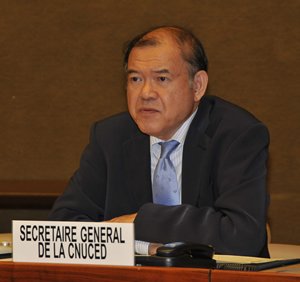He expressed concern about the fragility of the global economic recovery and the continuing lack of reforms to the international financial system, resulting in the prevalence of conditions that led to the onset of the economic and financial crisis in 2007-8.
Global economic growth in 2011 was around 2.7%, Dr. Supachai said, and current figures show little improvement in 2012. “It’s really a crisis that we all have to cope with together.” One issue that remains to be addressed is the continued international economic reliance on what he called the “financial economy” at the expense of the “real economy” which deals with actual production of goods and services and which accounts for most employment. “The kind of financial reforms that we would like to see around the world have not occurred,” he said.
 Meanwhile, stimulus measures and quantitative easing in a number of developed countries have had results in raising stock prices, but whether such steps will have “real” results, such as significant increases in employment, remains to be seen, Dr. Supachai said.
Meanwhile, stimulus measures and quantitative easing in a number of developed countries have had results in raising stock prices, but whether such steps will have “real” results, such as significant increases in employment, remains to be seen, Dr. Supachai said.
He pointed out that the main reason for the sputtering global recovery and the expectation of a further slowdown next year continues to be a lack of demand.
Citing UNCTAD’s Trade and Development Report 2012, released last week, he said the report shows that fiscal austerity and wage compression have further weakened growth in developed countries without achieving the expected results of reduced fiscal deficits, job creation, and renewed confidence in the financial markets. He also pointed to the Report, which focuses on income inequality, as having made the case that “inequality is expanding everywhere” and is a trend that limits economic growth and must be addressed.
Turning to UNCTAD’s new Investment Policy Framework for Sustainable Development – introduced in the organization’s World Investment Report 2012 -- he said that this is an area of work that could make “investment more relevant for domestic development-based strategies.” Another publication, Economic Development in Africa 2012, offers useful guidance for how African countries can pursue and achieve “green” economic growth, he said.
“Opportunities abound in various areas of our work to discuss how we can address the kind of inclusive growth we discussed at Qatar” – at the UNCTAD XIII quadrennial conference in April – “and to discuss development-centered globalization. Globalization is not going to go away,” the Secretary-General said.
“Globalization will keep up its pace and even accelerate,” Dr. Supachai said, “driven by technological change around the world. It is now being driven not just by research and development in developed countries, but also in developing countries. This is the main exogenous factor driving globalization forward.”
He said one positive outcome of UNCTAD XIII is strengthened connections with the nations of the Middle East. Another is renewed determination to help least developed countries (LDCs) “graduate” from LDC status. “I hope by the time of UNCTAD XIV, in four years, a number of LDCs will have graduated,” he told the meeting.
"It is essential for all countries, especially developing ones, to better integrate their macroeconomic policies, industrial strategies and foreign investment measures with their overall development goals, " Dr. Supachai advised.


